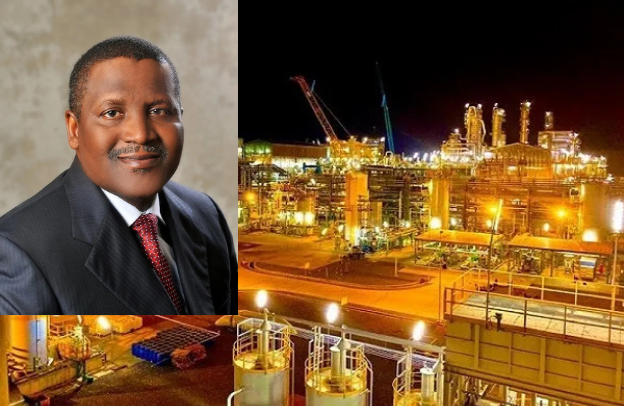Rooted Revival: How Dangote’s Fertilizer Push Could Signal a New Chapter in Africa

When Nigerian industrialist Aliko Dangote recently proclaimed that Africa could become fully self-sufficient in fertilizer within the next 40 months, it was more than just an economic promise. For many across the African diaspora, it felt like a symbolic turning point, a bold effort to take back ownership of Africa’s agricultural future and rewrite the continent’s role in global food systems.
Learn How to Leverage Your Story through our Story To Asset Framework.
Make no mistake, Africa has long played a vital role in the global food supply.
Before the discovery of crude oil in Nigeria, for example, the country was known for its thriving agricultural sector.
Iconic landmarks like the Kano groundnut pyramids in the 1960s and 70s stood as symbols of this prosperity, while institutions such as the Nigerian Institute for Oil Palm Research (NIFOR) in Benin City underscored the nation’s commitment to agricultural advancement.
To this day, Nigeria remains the world’s leading producer of cassava, contributing over 60 million metric tons annually, more than 20% of global output. Nigeria also leads Africa in the production of yams and rice.
Maintaining and expanding these achievements hinges on continued access to critical inputs, particularly fertilizers, which are essential for sustainable agricultural growth.
At its core, Dangote’s plan represents a deeper shift: from dependency to self-reliance, from fragmented food systems to empowered communities.
See also Dangote’s Welcome Disruption (Reflecting On The Irony Of Nigerian Petroleum) By Austin Isikhuemen
And for those in the diaspora looking to reconnect with the continent through agritourism, heritage, and sustainable investment, it offers fertile ground literally and figuratively for a new kind of homecoming.
The Fertilizer Shortfall: A Longstanding Barrier to Africa’s Growth
Today, much of Africa relies heavily on imported fertilizer, more than 6 million metric tons every year, to support its agricultural sector.
This dependency has long strained national budgets, destabilized local currencies, and hindered the ability of small-scale farmers to grow enough food under often harsh climate conditions.
In countries like Nigeria, the reliance on fertilizer imports doesn’t just affect farming; it affects everything downstream: from food prices in the market to the viability of agritourism projects that rely on healthy, productive farms. With weakened soils and limited access to inputs, many African farms can’t meet their full potential.
At AClasses Media, we offer hundreds of in-depth articles exploring the vast opportunities within African agriculture and agribusiness. Dive in and discover the untapped potential waiting to be explored.
For diaspora-led agricultural and cultural initiatives, whether community gardens, rural retreats, or farm-to-table culinary experiences, this creates a tough reality. It becomes difficult to create immersive, dignified, and profitable tourism experiences rooted in land stewardship if that land isn’t nourished from within.
Building Africa’s Fertilizer Future
At the center of this agricultural transformation is Dangote’s $2.5 billion fertilizer plant, already the largest in Africa, located near Lagos, Nigeria. Currently producing around 3 million metric tons of granulated urea annually, the plant already exports to major markets such as the United States, Brazil, and India.
But Dangote wants more. At the 2024 Afreximbank Annual Meeting in Abuja, he laid out his vision: to double production and end Africa’s need to import fertilizer altogether within just over three years.
“If we get it right,” Dangote said, “Africa will no longer be at the mercy of foreign supply chains. We’ll be feeding ourselves and exporting to the world.”
It’s not just talking. Dangote’s team has already proven capable of delivering large-scale projects, most notably the Dangote Petroleum Refinery, now the largest on the continent. While that project faced delays and cost overruns, it still marked a significant leap forward in African industrial capacity.
This fertilizer initiative could have an even more direct impact, especially for rural communities and agriculture-based economies. Fertile land is Africa’s greatest underutilized asset. Dangote’s expansion may be the boost needed to unlock it.
Diaspora Implications: From Investment to Identity
For the African diaspora, developments like Dangote’s fertilizer revolution aren’t just economic milestones; they represent a generational opportunity to reconnect, reinvest, and redefine identity through action.
Recently, Obehi Ewanfoh, founder of AClasses Media and WeDiasporan, a nonprofit dedicated to connecting the African diaspora to their roots, met with government officials in Milan to explore collaboration between Lagos and the Italian city of Milan.
With nearly 100,000 Nigerians living in Italy, Obehi emphasized that the moment is ripe for building bridges, not just politically, but economically and culturally.
During the high-level meeting held on the 30th floor of Milan’s iconic Pirelli Tower, he outlined that both Nigerian and Italian business leaders need to explore joint ventures, highlighting that African businesses are prepared for meaningful collaboration, and the diaspora must be at the center of it.
Around the world, there’s a rising wave of interest among Black communities to return to Africa, not just as tourists, but as stakeholders.
From acquiring land to launching heritage-based businesses and cultural initiatives, the desire to reconnect is growing stronger. And with Africa making major strides toward agricultural self-sufficiency, the landscape is shifting.
Fertilizer may seem like a technical detail, but in reality, it’s deeply personal. It determines whether a small rural village can feed visiting tourists, whether a local chef can host a farm-to-table diaspora experience, or whether a family-owned farm can scale into a sustainable agribusiness.
Now, picture a group of diaspora travelers walking through cocoa farms in Ghana or cassava fields in Nigeria. With improved yields and modern agricultural inputs, these aren’t just farms; they become vibrant, interactive spaces for storytelling, cultural exchange, and investment.
Fertilizer, in this context, isn’t just about crops; it’s the key that unlocks a new era of agritourism, one that is meaningful, profitable, and deeply rooted in identity.
Beyond the Factory: The Infrastructure Challenge
Of course, production alone isn’t enough. Infrastructure remains a major hurdle. Fertilizers must reach rural farmers, and that requires roads, reliable transport, and efficient port systems.
Nigeria has long struggled with bottlenecks and inefficiencies that delay goods and drive up costs.
Analysts like Seth Goldstein of Morningstar have pointed out that projects of this scale often run into logistical issues, especially in developing markets. Likewise, Control Risks has noted the urgent need for better port capacity and internal transport systems in Nigeria to match Dangote’s expansion plans.
See also Time’s Interview With Aliko Dangote, The Richest Man In Africa
However, these challenges also open the door to innovation and diaspora collaboration. African-descended engineers, architects, logistics experts, and investors can become part of this transformation, building the literal and figurative bridges needed to move goods and people across the continent.
Agritourism Reimagined: Fertility, Food, and Future
With improved fertilizer access, African farms are poised to produce more, diversify crops, and strengthen the foundations of rural tourism. This means richer stories for visitors to experience, beyond simple sightseeing.
Imagine a diasporan family traveling to Nigeria for the first time, staying on a working farm where they can participate in planting, harvesting, or food preparation. With robust crops and a strong local supply chain, such experiences become immersive, educational, and deeply healing.
At its best, diaspora agritourism isn’t just about travel—it’s about return. It’s a way for people separated by history and geography to reestablish a bond with the land, to contribute to economic growth, and participate in the continent’s rising narrative of self-sufficiency.
Financial Opportunity & Diaspora Investment
Aliko Dangote’s fertilizer expansion is more than just big business; it’s a golden opportunity for Africans everywhere. The IPO of Dangote Fertilizer, now slated for Q4 2025 on the Nigerian Exchange, is projected to value the company at $2.5–3.5 billion, with many analysts estimating around $3 billion.
For the African diaspora, this isn’t just another stock to buy; it’s a chance to be part of our own agricultural revolution.
See also Remembering Nitel And Nipost A Wake-Up Call For Nnpc By Austin Isikhuemen
Imagine investing in ventures that matter: sustainable farms, eco-lodges, cultural hubs, and agripreneur tourism, all fueled by locally produced fertilizer. When farmers can access high-quality urea at homegrown prices, it paves the way for richer yields, more vibrant crops, and deeper storytelling opportunities right from the soil up.
Infrastructure: Turning Vision Into Reality
Yet infrastructure remains Africa’s missing puzzle piece. Right now, 80% of fertilizer in Nigeria still travels by rough roads to rural farms, leading to delays, high costs, and even product spoilage.
Experts say the answer lies in multimodal transport: integrating railways, ports, and inland waterways, not just to move fertilizer efficiently but also to support agritourism, cultural events, and farm-to-table tourism while reducing carbon emissions.
This is where the diaspora can shine: with expertise in logistics, engineering, urban planning, and sustainability.
We can champion better roads, push for modern rail links, and help bring products and people to life with upgraded ports and waterways. It’s not just infrastructure; it’s the backbone for a whole new era of African agritourism.
Community Impact: Developing with Heart
Of course, big projects have some ugly impacts. In Lekki, Dangote’s fertilizer and refinery developments have displaced ancestral farmlands, disrupted ecosystems, and impacted fishing communities. People have raised concerns about losing their biodiversity and way of life.
But here’s the thing: local communities want to progress too. When done right, development becomes inclusive and empowering:
- Environmental co-ops: run by local-diaspora teams, to monitor air, water, and soil health.
- Profit-sharing agritourism lodges: where communities host and earn from farm stays and cultural experiences.
- Skills and job-training programs: to help local youth step into roles in logistics, hospitality, and agriculture.
When communities are at the center, development doesn’t just happen to them; it happens with them.
Fertilizer as Metaphor, and Momentum
Fertilizer isn’t just a bag of chemicals; it’s a seed of promise. Dangote’s expansion sends a powerful signal: Africa is ready to nourish itself again. For the diaspora, it’s an invitation to come home and dig in, literally and figuratively.
See also How Diaspora Businesses Can Leverage African Talent in the Global Creative Economy
Picture this: diaspora travelers in cocoa farms in Ghana or yam fields in Nigeria. They dig, harvest, laugh, and listen to ancestral folktales shared in the fields. Crops fed by African-made urea, hands joined in tradition, and souls rooted in home.
Here, agritourism becomes so much more than sightseeing; it becomes a path to healing and reconnection, grounded not in luxury but in soil, memory, and legacy.
Conclusion: Agribusiness Meets Agribridging
Dangote’s fertilizer project is a milestone in Africa’s pursuit of food sovereignty and economic resilience. But it’s also a bridge for diaspora reconnection: spiritually, emotionally, and economically.
As African-made urea renews the land, it also nurtures the dreams of those who’ve longed to return. Financial returns matter, yes—but so do the human returns: cultural revival, heritage reconnection, and intergenerational healing.
Will Africa be fertilizer self-sufficient by 2028? Challenges remain roads to fix, policies to update, and communities to engage. But where unity and vision align, progress is possible.
Learn How to Leverage Your Story through our Story To Asset Framework.






